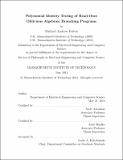Polynomial identity testing of read-once oblivious algebraic branching programs
Author(s)
Forbes, Michael Andrew
DownloadFull printable version (1.484Mb)
Other Contributors
Massachusetts Institute of Technology. Department of Electrical Engineering and Computer Science.
Advisor
Scott Aaronson and Amir Shpilka.
Terms of use
Metadata
Show full item recordAbstract
We study the problem of obtaining efficient, deterministic, black-box polynomial identity testing algorithms (PIT) for algebraic branching programs (ABPs) that are read-once and oblivious. This class has an efficient, deterministic, white-box polynomial identity testing algorithm (due to Raz and Shpilka [RS05]), but prior to this work there was no known such black-box algorithm. The main result of this work gives the first quasi-polynomial sized hitting set for size S circuits from this class, when the order of the variables is known. As our hitting set is of size exp(lg2 S), this is analogous (in the terminology of boolean pseudorandomness) to a seed-length of lg2 S, which is the seed length of the pseudorandom generators of Nisan [Nis92] and Impagliazzo-Nisan-Wigderson [INW94] for read-once oblivious boolean branching programs. Thus our work can be seen as an algebraic analogue of these foundational results in boolean pseudorandomness. We also show that several other circuit classes can be black-box reduced to readonce oblivious ABPs, including non-commutative ABPs and diagonal depth-4 circuits, and consequently obtain similar hitting sets for these classes as well. To establish the above hitting sets, we use a form of dimension reduction we call a rank condenser, which maps a large-dimensional space to a medium-dimensional space, while preserving the rank of low-dimensional subspaces. We give an explicit construction of a rank condenser that is randomness efficient and show how it can be used as a form of oblivious Gaussian elimination. As an application, we strengthen a result of Mulmuley [Mul12a], and show that derandomizing a particular case of the Noether Normalization Lemma is reducible to black-box PIT of read-once oblivious ABPs. Using our hitting set results, this gives a derandomization of Noether Normalization in that case.
Description
Thesis: Ph. D., Massachusetts Institute of Technology, Department of Electrical Engineering and Computer Science, 2014. This electronic version was submitted by the student author. The certified thesis is available in the Institute Archives and Special Collections. Cataloged from student-submitted PDF version of thesis. Includes bibliographical references (pages 209-220).
Date issued
2014Department
Massachusetts Institute of Technology. Department of Electrical Engineering and Computer SciencePublisher
Massachusetts Institute of Technology
Keywords
Electrical Engineering and Computer Science.